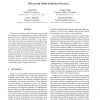Free Online Productivity Tools
i2Speak
i2Symbol
i2OCR
iTex2Img
iWeb2Print
iWeb2Shot
i2Type
iPdf2Split
iPdf2Merge
i2Bopomofo
i2Arabic
i2Style
i2Image
i2PDF
iLatex2Rtf
Sci2ools
CSFW
2007
IEEE
2007
IEEE
Privacy and Utility in Business Processes
se an abstract model of business processes for the purpose of (i) evaluating privacy policy in light of the goals of the process and (ii) developing automated support for privacy policy compliance and audit. In our model, agents that send and receive tagged personal information are assigned organizational roles and responsibilities. We present approaches and algorithms for determining whether a business process design simultaneously achieves privacy and the goals of the organization (utility). The model also allows us to develop a notion of minimal exposure of personal information, for a given process. We investigate the problem of auditing with inexact information and develop methods to identify a set of potentially culpable individuals when privacy is breached. The audit methods draw on traditional causality concepts to reduce the effort needed to search audit logs for irresponsible actions.
| Added | 02 Jun 2010 |
| Updated | 02 Jun 2010 |
| Type | Conference |
| Year | 2007 |
| Where | CSFW |
| Authors | Adam Barth, John C. Mitchell, Anupam Datta, Sharada Sundaram |
Comments (0)

